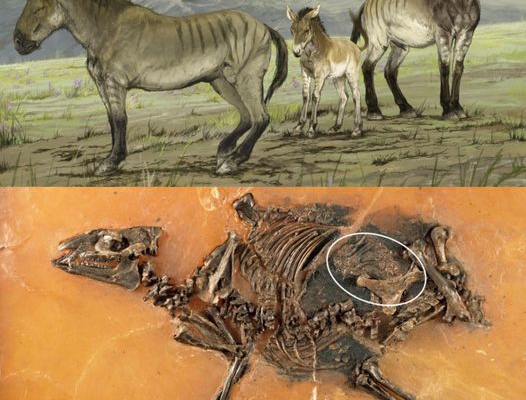In a groundbreaking archaeological revelation that has sparked fascination among scientists and the general public alike, researchers have unearthed a fossilized unborn ‘horse’ inside the womb of its mother, an astonishing 48 million years after their demise. This extraordinary discovery provides a rare and intimate glimpse into the reproductive biology of ancient equine species, offering fresh insights into the evolution and life cycle of these majestic animals. Join us as we explore the intriguing realm of prehistoric pregnancy and reveal the hidden secrets within this remarkable fossil.

Revealing an Extraordinary Discovery
The fossilized remains emerged from the depths of the Messel Pit, a UNESCO World Heritage site nestled near Darmstadt, Germany. Renowned for its exceptional preservation of prehistoric fossils, this location houses relics dating back to the Eocene epoch, approximately 48 million years ago. Unveiled by a team of paleontologists from the Senckenberg Research Institute during their excavations, this remarkable find has garnered significant attention.
Upon meticulous examination, researchers were astonished to uncover the nearly intact skeleton of an unborn horse still cradled within its mother’s womb. The fossilized remnants encompass the delicate bones of the fetus, alongside a preserved outline of its soft tissues, offering an unparalleled insight into its developmental stage at the time of demise.

Insights from the Fossil
Insights from the Extraordinary Fossil Discovery
The remarkable finding provides valuable insights into the reproductive biology of ancient horses. The fossilized fetus, estimated to measure just 12 inches in length, offers evidence of late-term pregnancy in these early equine species. The position of the fetus within the womb suggests that the mother was in the final stages of gestation when she died, presenting a poignant snapshot of a life tragically cut short.
Moreover, the fossil offers clues about the evolutionary history of horses and their ancestors. Through the study of the skeletal structure and development of the unborn foal, scientists can gain a better understanding of how these animals adapted and evolved over millions of years. This information is crucial for piecing together the complex puzzle of horse evolution and the role of reproductive strategies in shaping their evolutionary trajectory.

The Importance of the Discovery
The discovery of this fossilized unborn horse transcends mere scientific curiosity; it stands as a testament to the remarkable power of preservation and the narratives fossils can convey. It presents a rare opportunity to explore the reproductive biology of ancient creatures and offers a unique perspective on the challenges and adaptations experienced by prehistoric species.
Moreover, this find underscores the importance of safeguarding and conserving our planet’s natural heritage. Sites like the Messel Pit serve as invaluable repositories of information about Earth’s history and the evolution of life on our planet. By studying and learning from these fossils, we can develop a deeper appreciation for the rich diversity of life that has thrived over millions of years and gain a better understanding of our role within the natural world.
Conclusion
The unearthing of a fossilized unborn horse nestled within its mother’s womb, dating back an astounding 48 million years, stands as an extraordinary find that has enraptured the global community. This remarkable fossil provides unprecedented insights into the reproductive biology and evolutionary journey of ancient horses, illuminating new aspects of their development and adaptation over millions of years.
As scientists delve deeper into the study of this remarkable specimen, we anticipate the unveiling of even more secrets about the lives of these prehistoric creatures and the remarkable evolutionary odyssey that has shaped the horses we are familiar with today. In the interim, this captivating discovery serves as a poignant reminder of the significance of preserving our planet’s natural heritage and the compelling narratives that fossils can unveil about the Earth’s life history.

